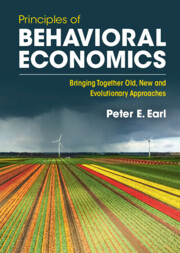Book contents
- Principles of Behavioral Economics
- Principles of Behavioral Economics
- Copyright page
- Contents
- Figures
- Tables
- Preface
- Acknowledgments
- 1 What Is Behavioral Economics?
- 2 What Motivates Us?
- 3 Why Is Life So Full of Problems for Us to Try to Solve?
- 4 How Do We Acknowledge Problems and Assess Options?
- 5 How Do We Deal with Uncertainty and Ambiguity?
- 6 How Do We Search for Solutions to Problems?
- 7 Why Do Some Things Matter More Than Others?
- 8 How Do We Choose?
- 9 How Can Firms and Governments Influence Our Choices?
- 10 What Determines the Productivity of an Organization?
- 11 How Does the Competitive Process Work?
- 12 Are There Any Behavioral Insights for Macroeconomists?
- 13 Can We Be Happy without Destroying the Environment?
- References
- Index
3 - Why Is Life So Full of Problems for Us to Try to Solve?
Published online by Cambridge University Press: 18 October 2022
- Principles of Behavioral Economics
- Principles of Behavioral Economics
- Copyright page
- Contents
- Figures
- Tables
- Preface
- Acknowledgments
- 1 What Is Behavioral Economics?
- 2 What Motivates Us?
- 3 Why Is Life So Full of Problems for Us to Try to Solve?
- 4 How Do We Acknowledge Problems and Assess Options?
- 5 How Do We Deal with Uncertainty and Ambiguity?
- 6 How Do We Search for Solutions to Problems?
- 7 Why Do Some Things Matter More Than Others?
- 8 How Do We Choose?
- 9 How Can Firms and Governments Influence Our Choices?
- 10 What Determines the Productivity of an Organization?
- 11 How Does the Competitive Process Work?
- 12 Are There Any Behavioral Insights for Macroeconomists?
- 13 Can We Be Happy without Destroying the Environment?
- References
- Index
Summary
The premise of this chapter is that it is useful to know why problems arise in everyday life before trying to understand how people set about trying to solve problems and thereby gain control and make their lives more predictable. We examine first how finite information processing and imaginative capacities limit how well existing problems can be analyzed, leading to further surprises for decision-makers. Next, we explore problems of obtaining knowledge about the behavior of others (that results in coordination failures) and of limited time to search and the problems posed by experience goods and credence goods. We then take a complex systems view of why some kinds of environments and products are prone to generate problems. This analysis emphasizes the significance of the connective structural architecture of systems, how linkages can cause problems to compound, the advantages of modular systems and the problems caused by absent prerequisites or corequisite elements for system functioning (in contrast to the presumption of substitution in orthodox economics). In light of this, there is a consideration of what it means to “get one’s priorities wrong” and the cognitive and systems challenges of poverty.
Keywords
- Type
- Chapter
- Information
- Principles of Behavioral EconomicsBringing Together Old, New and Evolutionary Approaches, pp. 50 - 80Publisher: Cambridge University PressPrint publication year: 2022

